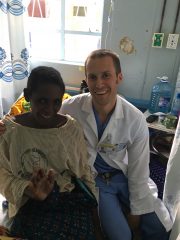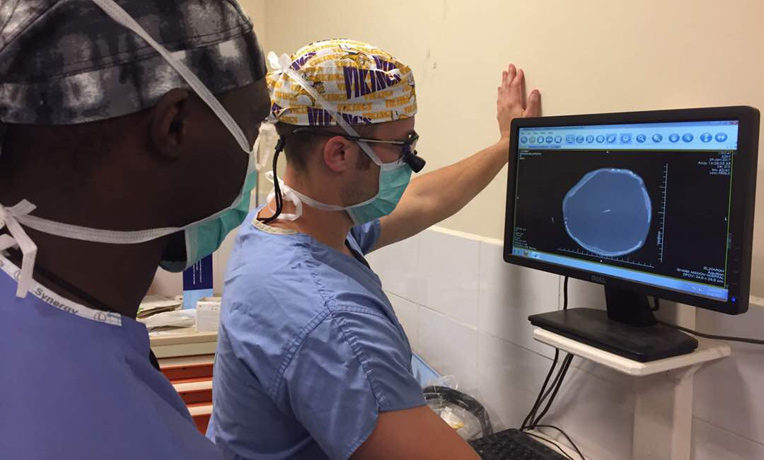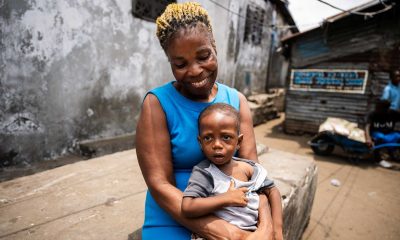A doctor sees God answer prayer
The CT scan of Flossy’s neck confirmed a severe spine dislocation that had resulted in a spinal cord injury.
Sixteen hours after we placed her in cervical traction, her spine had realigned. We were then able to take her to the operating room to perform a spine fusion, which uses screws and rods to hold the spine together while it heals.
One of the big differences between practicing in Kenya instead of the United States is that I am keenly aware of my finite amount of resources. With every spine fusion I try to carefully discern the minimum number of screws that I can use and still provide the best care for my patient. I try to keep an accurate inventory of how many screws and other necessary implants I have left.

Dr. Copeland and Flossy
I had decided I would use six screws for Flossy’s case, and then after surgery leave her in a neck brace while she recovered. I hadn’t done such a good job of keeping an accurate inventory. Here I was in surgery, feeling good about the six screws I had just put in, and about ready to finish. After you have placed your screws and put in the rods that connect those screws, you have to put in what are called locking caps, one for each screw, to keep the rods in place.
I knew I was running low on those, but for some reason I thought I had at least enough to finish. It was only six screws after all. So, I felt like an idiot when I opened the lid to the locking caps and saw only three. I rummaged through the rest of the set, thinking they had surely been misplaced, but I couldn’t find any.
I had already begun to strategize how I could most effectively use those three caps when suddenly I remembered that my wife Alisa had told me the day before that a newly arrived visitor to Tenwek had dropped off a package at our house with supplies.
I had told people in the United States of my locking cap shortage and was expecting spine equipment to arrive soon. I quickly unscrubbed from the case and ran home to see if this package had what I needed.
It was like Christmas morning when I tore the box open and sitting there in a Ziploc bag were more than a dozen locking caps! Still out of breath, I made the run back to the hospital, scrubbed in, and finished Flossy’s case.
Dr. Al Rhoton was one of the most influential figures the world of neurosurgery has ever known. You would be hard pressed to find a neurosurgeon anywhere who doesn’t know the significance of his efforts.
He used to say that if God had come to earth and had told him as a young man, “Al, today a boy is being born who is going to develop a brain tumor that will cause him to become deaf, then unable to walk, and ultimately this tumor will take his life. However, if you go through 12 years of schooling, then four years of college, four years of medical school, seven years of residency, sit through countless exams, and sacrifice time with family and friends, at the end of all those grueling years you at last will become a neurosurgeon. Yet all that time and studying will be not for the sake of saving the lives of thousands, but that of only this single boy. Would the sacrifice be worth it?”
And Dr. Rhoton always said with conviction, “Of course it would.”
Some people suggest that medical missions is a waste of time and resources because there will always be countless people to be treated. But like Dr. Rhoton, if all my studying, if all my training, if all my efforts at Tenwek, no matter how many the years, were only for the sake of treating one person who might come to understand God’s love for them and His desire to give them life to the fullest, my response would be same.
Of course, it was worth it.






